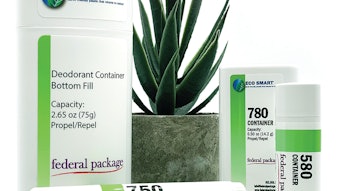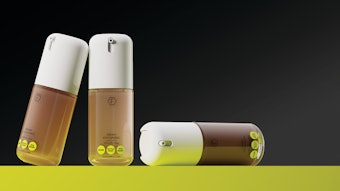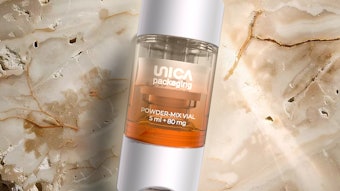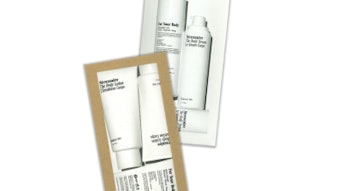Editor's note: This article originally ran in the August 2013 issue of Cosmetics & Toiletries magazine and is reprinted with permission. All rights reserved.
Packaging. Marketers know from a host of consumer studies that the first time most consumers become acquainted with products is at the point-of-purchase, which still primarily occurs in a brick-and-mortar store. Not only that, but also the majority of purchase decisions—despite the consumer’s previous exposure to advertisements and other forms of promotion—are made at the point-of-purchase, sometimes rather spontaneously. All of this means that labeling and packaging decisions should be of paramount importance to product developers. Therefore, the decisions involved are not just about what is put into a product, but what goes on the product package—and to this latter point, the rules pertaining to desired claims.
For example, as is generally known in the United States, regulations surrounding most labeling decisions are under the purview of the U.S. Food and Drug Administration (FDA). There are labeling requirements for both categories of topical products, i.e., cosmetics and drugs, as well as certain claims that are allowed and disallowed depending on the product category—a rule that seems randomly enforced. By now, this area should be well-understood by marketers, although it is often abused as too many cosmetics companies continue to make claims that are not allowed, such as “reduces wrinkles” or “reverses aging.” These drug claims are monitored by the FDA, although it has the resources to address only the most egregious of offenders.
In relation, the industry has been waiting patiently for the government to create a “cosmeceuticals” category for topical products, just as the Act of Congress (DSHEA 1994) created the intermediate “nutritional supplements” category between “food” and “drugs,” which is now almost 20 years old. Indeed, certain statements of “nutritional support” are allowed when a product is classified as a dietary supplement rather than a food or drug, but these statements cannot be “health” claims, which are only allowed for products classified as drugs.
Beyond Claims: The Proliferation of Certifications
In the world of natural and organic products, where many highly questionable active ingredient claims abound, there is another confusing labeling aspect through which consumers must sort: various third-party certifications. These relate to products that are greener, and more naturally derived and processed, but have become a source of further confusion for both consumers and marketers alike. On the other hand, having such certifications is helpful since government regulation is lacking in this high growth segment, resulting in “green washing” and product puffery among marketers. Due to this, it is no longer enough to simply make a natural or some other green claim on a label. In the name of transparency and authenticity—two emerging issues in the industry—marketers must strive to differentiate and prove to consumers that products are exactly what they say they are. How does one sort through this mess?
First, take a deep breath; it’s not that complicated. If a product is sold through a natural foods outlet such as Whole Foods Markets, it has already endured a litany of scrutiny, as the requirements these retailers impose on themselves are equally as rigorous, if not more so, than any certification. That is, the “easy way out” is to trust the standards of Whole Foods Markets. Bear in mind, however, that not everyone has the means to shop at premium outlets, so what about the standards of mass retailers like Wal-Mart Stores Inc.? Not so much; over 20 years in the industry has taught this author at least that. If a product is to be sold through channel that does not have its own natural and organic standards, it is important that the product carry a seal from a third-party certifier. There are far too many certifications around the world to analyze them all, and many do not apply to personal care. Therefore, for the sake of relevancy (and sanity), the focus here will be on commonly used seals within the natural and organic personal care area.
Important North American Certifications
USDA: In the United States, there are a few highly recognizable seals commonly displayed on the labels of natural and organic personal care products. One of these is backed by the U.S. government. The U.S. Department of Agriculture (USDA) oversees a program that allows third-party organizations to denote products as “Certified Organic” if they meet the stringent requirements of the National Organic Program1 (NOP). Since this process is relatively expensive, not many personal care products carry the now-ubiquitous green and white seal, but there are certainly quite a few food brands that have gone this route. The USDA standards were originally developed solely for food and not for topical products, so in the past there has been some difficulty in adapting them for personal care.
Due to its popularity with food products, this is the preferred seal in the United States if one’s product is positioned as organic—although there is another certification issued by the National Science Foundation (NSF) for products having less organic content, or for companies that do not wish to qualify their products for the USDA seal. This seal is a relatively recent introduction, developed to provide a distinction for products that contain lower levels of organic ingredients. It has yet to gain wider use by branded product manufacturers.
NPA Natural seal: Another certification that has proliferated in the United States is a seal whose origins lie in a task force organized and managed by this author, back in 2003. The task force, called the International Association of Natural Products Producers (IANPP), consisted of three dozen organizations from throughout the supply chain, which after three years finally succeeded in drafting a definition for “natural.” Note that natural and organic are two different designations, and the Natural Products Association (NPA) seal deals only with “natural” and not “certified organic.”
Whereas organic ingredients are inherently natural, natural ingredients are certified organic only if they meet the NOP requirements. In general, a natural ingredient can be neither synthetically derived nor synthetically processed; in turn, a natural product must be comprised of a large majority of natural ingredients. Human health/safety, animal testing and biodegradability are also issues addressed by the NPA but it is important to note that the association has been criticized for allowing the use of genetically modified ingredients (GMOs).
This work by the IANPP was forwarded to the NPA and resulted in the NPA Natural seal, which has now been incorporated on the packages of just over 1,000 different personal care products. If one is selling a product positioned as natural in the United States, this is the preferred seal because it is backed by the major U.S. association for natural products companies.
OASIS: Worth mentioning are the Organic and Sustainable Industry Standards (OASIS),2 developed in 2008 by the namesake OASIS nonprofit organization, these reportedly were the first U.S. organic standards for personal care. They were written in response to confusion over the relevancy of USDA Organic regulations to personal care. Much of this confusion has apparently been addressed by USDA and aforementioned NSF certifications, however, as there is not much recent coverage about the group’s activities.
Global Need
If the USDA Certified Organic and NPA Natural seals are achieving notoriety in the United States, what about other regions? As one might expect, the landscape is scattered with not-for-profit efforts to certify products as being something other than synthetically derived and/or synthetically processed. The health and wellness movement is now a well-established trend, rather than a short-lived fad, so the quest for products that are better for people and the natural environment will not go away. Therefore, efforts to distinguish products as such also will not abate; consider the following look around the globe.
European Standards
Standards around the world for natural products are largely the same, and each standard is really intended for products made and marketed within the country or region of the certifier. Products are generally analyzed and rated along several different parameters, including the origin and processing of their ingredients, and the total composition of them in the product; their storage, manufacturing and packaging; environmental management; labeling and communication; inspection; and certification and control. The bottom line is that the certification must resonate with consumers in that particular country or region. Some markets, such as the U.S., have been a little late to the game of natural and organic personal care product certification. This is why the Ecocert seal (detailed later in this article), offered by a French certifier, is found on so many products in the United States. Until relatively recently, it was one of the only options available to American manufacturers.
COSMOS: While there are a number of different certifiers in Europe, the good news is their standards have been harmonized under the Cosmetics Organic and Natural Standard (COSMOS). This means that an Ecocert-labeled product will have been subjected to the same scrutiny as a BDIH product, for example; following, these are described in more detail. The COSMOS distinction should eventually replace all of the individual certifications, but this will take some time as each certifier is a separate entity, and therefore self-interested. But consumers will ultimately be best served by one COSMOS seal.
COSMOS was developed at the European level by a group of well-established and highly influential certifiers: Bubdesverband Deutscher Industrieund Handelsunternehmen (BDIH) of Germany; Association Profesionnelle de Cosmetique Ecologique et Biologique (COSMEBIO), and Organisme de Controle et de Certification (Ecocert) of France; Instituto per la Certificazione Etica e Ambientale (ICEA), and L’Associazione Italiana per l’Agricoltura Biologica (AIAB) of Italy; and the Soil Association of the U.K. These groups founded an international non-profit association that was registered in Belgium on Nov. 4, 2008—the Association Internationale Sans But Lucratif (AISBL)—and collaborated to define common requirements and definitions for organic and natural cosmetics. For the group, addressing the excesses and failures of current developments is a key challenge, and establishing “sustainable development”—yet another term for products that are better for human health and the natural environment—to reconcile economic progress, social responsibility and maintain the natural balance is its goal.3
BDIH (Germany): This group4 is an association of industries and trading firms for pharmaceuticals, health care products, food supplements and personal hygiene products. The association has organized producers and distributors of cosmetics and natural cosmetics, food supplements, nutritional foods, over-the-counter medications and medical devices.
Cosmebio (France): This French trade association5 is focused on ecological and biological cosmetics. It organizes suppliers of ingredients, cosmetic laboratories, made-to-order manufacturers and distributors, and represents both French and foreign members. Created in 2002, Cosmebio is at the origin of the French Charter of Ecological and Biological Cosmetics, which defines the rules and basic principles for the manufacturers who wish to engage in this step.
Ecocert (France): Ecocert is an inspection and certification body6 that was established in France in 1991 by agronomists that were aware of the need to develop environmentally friendly agriculture, and of the importance of offering some form of recognition to those committed to this method of production. The Ecocert seal certifies the compliance of a company’s products, systems or services with its standard, and has contributed to the expansion of organic farming.
ICEA (Italy): This non-profit consortium7 of associations and organizations is connected with environmentally friendliness, fair trade and sustainable development. The consortium was founded with a view to offering a certification service based on the principles of independence, transparency, objectivity, impartiality and competence.
AIAB (Italy): This cultural association8 is recognized by the Italian Ministry of Agriculture and promotes organic agriculture, sustainable rural development and healthy nutrition. AIAB is responsible for the publication of organic production and processing codes of practice in the food, textiles, timber, catering, retail and eco-tourism sectors. It also co-manages an observatory on the prices of organic products; the Centre of Ecological Agronomic Demonstrations (CEDA) and Selforganized Offer and Demand Groups (GODO); and publishes the national magazine Bioagricultura.
Soil Association (U.K.): The Soil Association9 was founded in 1946 by a group of farmers, scientists and nutritionists that observed a direct connection between farming practice and plant, animal, human and environmental health. Today, it is the U.K.’s leading membership charity, campaigning for healthy, humane and sustainable food, farming and land use. As a charity, the Soil Association is reliant upon donations and the support of its members and the public to carry out its work.
AISBL (Belgium): As noted, the AISBL10 is the international non-profit association whose objective is to offer an internationally recognized standard for organic and natural cosmetics. In 2002, the founding organizations of COSMOS recognized that both the cosmetics industry and market are international, and that companies and consumers would be best served by a single standard.
Others in Europe: Other European certifiers include the Organic Farmers and Growers in the U.K.; the International Federation of Organic Agriculture Movement (IFOAM) in Germany; Eco Garantie’s eco-seal program in the Netherlands,11 and NaTrue’s Natural and Organic Cosmetics program12 in Belgium. There are also many niche players throughout the region, and just about everyone in this space wants to certify products from around the world since products and seals really know no geographic boundaries.
Australian Standards
The National Association for Sustainable Agriculture (NASAA) is one of Australia’s leading organic certifiers, and focuses on providing quality, cost efficient organic certification services. It operates both in Australia and parts of Asia, including Thailand.13
Another important organic regulatory group is the Biological Farmers of Australia (BFA).14 This not-for-profit organization represents and develops the interests of more than 3,000 organic industry farmers, operators, producers, processors and traders. BFA also serves the greater community, taking on a role to educate the public about the benefits of organic food and farming. It is active in the development of organic standards, lobbying governments on behalf of the organic industry, and supporting the growth of the organic domestic and international markets for Australian operators. Further, it provides market intelligence and export requirements, and assists in the development of contacts and networking.
South and Latin American Standards
IBD Certifications is a Brazilian company15 that carries out agricultural, processing, wild harvesting, organic, biodynamic and fair trade inspection and certification activities under its IBD Certified Organic label. The group works in Brazil and Latin America to develop sustainable agriculture based on new economic, social and ecological relationships. This leading certifier has operations in Brazil, the United States, Mexico, Belgium, Paraguay, China, Thailand, India, Canada and Europe. It is approved by the Brazilian Ministry for organic production.
Besides the IBD Organic program, the company manages the fair trade programs EcoSocial and INTEGRA, as well as non-genetically modified organisms (GMOs), organic and natural cosmetics, and input approval programs. Further, the company is approved by the climate protection program Stop Climate Change (SCC), and has also been approved by the NSF and NaTrue cosmetic programs.
China and India
China, India and developing nations have yet to develop meaningful natural and organic certifications for products manufactured and sold in these regions. Companies based here often adopt North American or European standards, but, again, the choice for certification should really depend on where the product is being sold for maximum effectiveness. Understandably, the markets for natural and organic personal care products in relatively poorer countries are underdeveloped, so certifications are not terribly relevant to them.
‘Rule of Thumb’
If all these options seem confusing for the industry to digest, just think how the average layperson feels. It stands to reason that a good rule of thumb for those targeting the natural and organic market is: Embrace the seal that pertains to the desired market and region. Other than the European COSMOS harmonization effort, cosmetic- specific standards are pretty well-fragmented; however, dominant seals, such as Ecocert and USDA, are beginning to emerge as the preferred. Regardless of the specified certification, remember that consumers are reading labels at an accelerating rate. Therefore, what is on the label is increasing in importance. Choose wisely when it comes to certifications, and be careful with those product claims.
References
- www.ams.usda.gov/nop
- www.oasisseal.org
- www.cosmos-standard.org
- www.bdih.de
- www.cosmebio.org
- www.ecocert.com/en/natural-and-organic-cosmetics
- www.icea.info
- www.aiab.it
- www.soilassociation.org
- www.ela-aisbl.org
- www.ecogarantie.com
- www.natrue.org
- www.nasaa.com.au
- www.bfa.com.au
- www.ibd.com.br
All websites accessed on June 25, 2013
Darrin C. Duber-Smith, MS, MBA, is president of Green Marketing, Inc. He has more than 25 years of expertise in marketing and management, including with natural, organic and green/sustainable products. He is a cofounder of the Lifestyles of Health and Sustainability, and he has published more than 70 articles. Duber-Smith also is a marketing professor at the Metropolitan State University of Denver School of Business and an affiliate marketing professor at the Leeds School of Business at the University of Colorado-Boulder. He received the Wall Street Journal’s In-Education Distinguished Professor Award in 2009, the 2012 School of Business Dean’s Award for Teaching Excellence, and is author of Cengage Learning’s “KnowNow! Marketing” blog. [email protected], [email protected]










